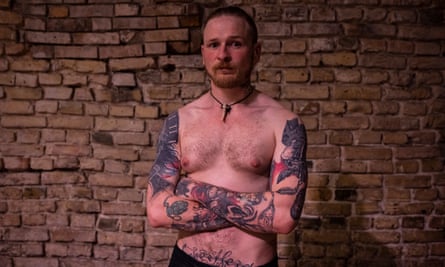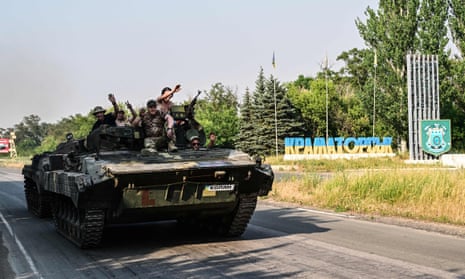Ukraine’s military has announced plans to introduce a system of permits that would prohibit men eligible for conscription from leaving the region where they are registered.
The move, based on legislation from 1992, was intended to enable the country’s armed forces to locate potential conscripts more easily, but it prompted an immediate backlash.
President Volodymyr Zelenskiy criticised the announcement in his nightly TV address to the nation on Tuesday, saying that the general staff should not make decisions without him. Two parliamentarians immediately filed draft legislation that would scrap the army’s initiative, which they described as “outdated”.
It remains unclear if movement permits for men will be introduced, but the army’s announcement highlights the precarious position facing Ukrainian men who could be conscripted to fight at any moment.
Since Zelenskiy declared martial law at the start of Russia’s invasion, Ukrainian men aged 18 to 60 are eligible for military service and are forbidden from leaving the country. There are a few exceptions such as men with poor health, or fathers of three or more children.
“I don’t want to fight. I want to continue working,” said Roman, a 31-year-old software developer in Kyiv. “But I also don’t want to think negatively about it because many of my friends have been mobilised and it’s not fair on them. I try not to think that if I’m mobilised it 100% means I will die or be injured or see fighting.”
When martial law was first announced, Ukraine’s authorities said conscription would occur in waves, starting with those who have previous military experience, and would reflect the army’s needs, focusing on medics or people with a science background, for example. Women can also be mobilised if their professional experience is needed but they cannot be compelled and are not expected to fight.
Thousands of Ukrainians have volunteered to fight or be reservists. By 6 March, about 100,000 had enlisted in the territorial defence force alone. But there are also those who worry about being sent into the frontlines, where a horrific artillery battle is raging, and between 100 and 200 Ukrainian soldiers are reportedly dying every day.
For some men, the prospect of conscription – and the uncertainty of not knowing when the call might come – looms oppressively.
“The worst thing about it is I don’t know how [mobilisation] is happening at the moment,” said Roman. “Will the conscription notice come to my house or will someone just stop me in the street? Should I continue renting my apartment? Should I buy [military equipment] or not?”
Last month, a group of men were detained by police at Otel, a well-known Kyiv nightclub, for allegedly breaking curfew and subsequently given conscription notices by the local military administrative office.
Maks Yudin, Otel’s installation artist and technician, and Pavlo Derhachov, the owner of Otel, were among them. Yudin described how they had held a daytime event – allowed within the curfew rules – and were taking down the set. He said he went to open the backdoor at 11pm to find a mass of police officers waiting outside.

“There were like five police officers for each person,” said Yudin, who is originally from Russia but moved to Ukraine in 2019. “The police have demonised this club for a long time even though we have been a base for volunteer work since the beginning of the war.”
Yudin himself volunteered as an army medic at the beginning of the war but, despite having a degree in medicine and previous military experience, he was rejected because of his Russian citizenship.
Otel still serves as a makeshift staging area for aid distribution. Behind the bar are shelves of goods stacked with goods for different cities near the frontlines as well as some equipment for a battalion they support. On the other side of the dancefloor, there is a crate of molotov cocktails.
Police said 219 people found at the club were given conscription notices, but Yudin and Derhachov say only about 10 to 15 people there.
“The kind of conscription notice they gave us is a bit like spam mail,” said Derhachov. “They are designed to encourage people to sign up to fight but there is no system to follow up. Luckily there are many of those people who will react and want to fight and that’s a great thing.”
A second type of conscription notice is delivered to an individual’s house and states why the army needs him.
“Since the war started, I have experienced a sort of survivor’s guilt syndrome because people are dying and I can’t feel good,” said Derhachov. “I’m actually glad that they closed the borders [for men] because it forces you to confront what’s happening even if it’s in a passive form. In one way or another, you have to participate.”
Derhachov said they still host occasional daytime events but not the “hedonistic, techno raves” that Kyiv was known for before the war. “Every event has collected money for the war – the army, a specific battalion or humanitarian aid,” he said.
“We are not at the stage of total mobilisation like in WWII,” Oleksandr Shulga, a former sociology academic at Ukraine’s academy of sciences, who signed up to fight on the first day of the war, explained. “There are plenty of people that are willing and are preparing for being mobilised. What I worry about is that after the war there will be a divide in society between those who did and didn’t fight.”
